DET Unit 4: Analyzing Stakeholder Impact on Education & Training
VerifiedAdded on 2023/06/08
|9
|2263
|218
Report
AI Summary
This report provides a comprehensive analysis of wider professional practice in education and training, focusing on the roles and impact of stakeholders and external bodies. It explains the importance of collaborative partnerships with employers and other stakeholders in enhancing the quality of education and training programs. The report also examines the impact of accountability to stakeholders on curriculum design, delivery, and assessment within the author's area of specialization, human resource management. It highlights the significance of aligning educational practices with stakeholder needs and adhering to guidelines set by external bodies like Ofsted and Pearson to ensure high standards and effective learning outcomes. The report concludes that continuous professional development and stakeholder engagement are crucial for educators to adapt to evolving industry demands and provide students with relevant skills and knowledge.
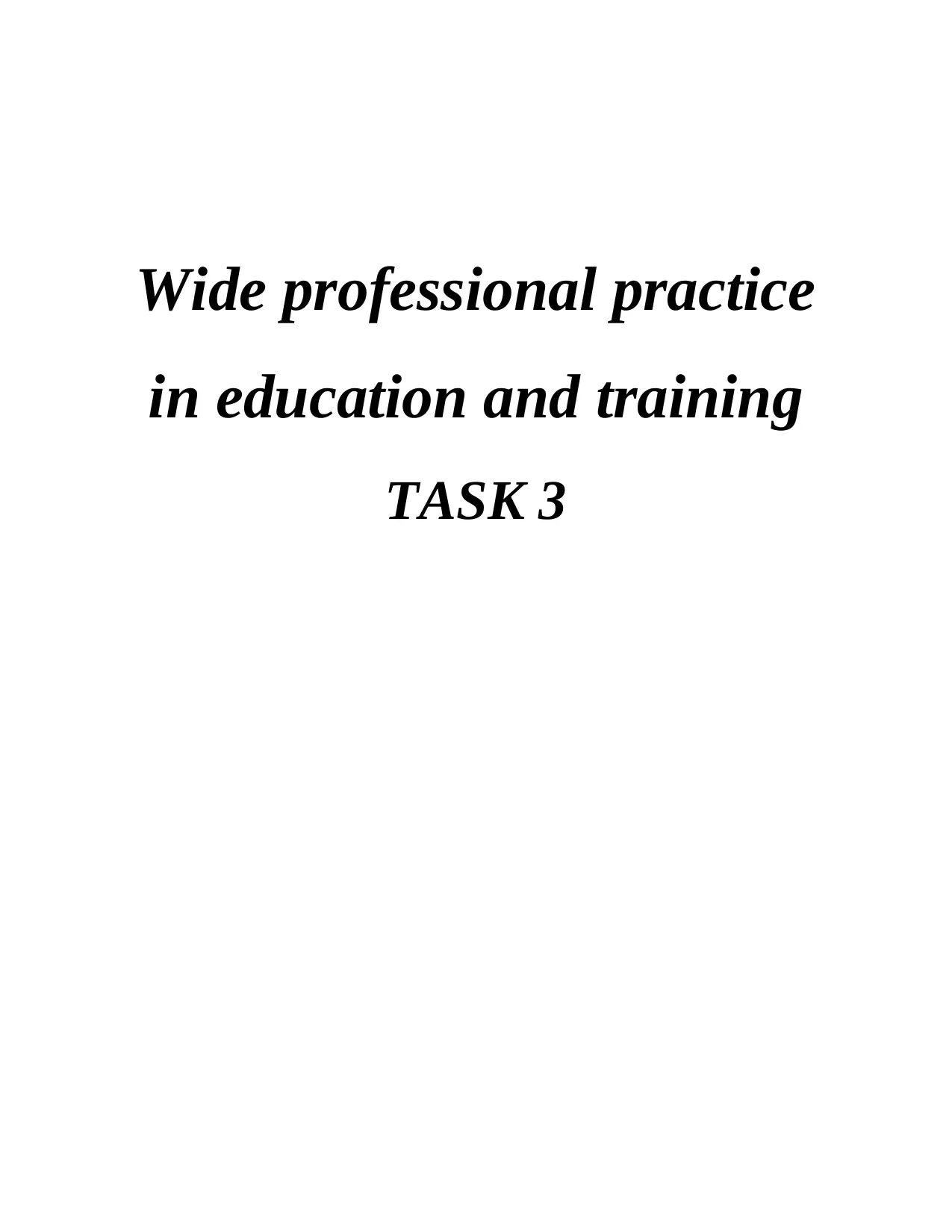
Wide professional practice
in education and training
TASK 3
in education and training
TASK 3
Paraphrase This Document
Need a fresh take? Get an instant paraphrase of this document with our AI Paraphraser
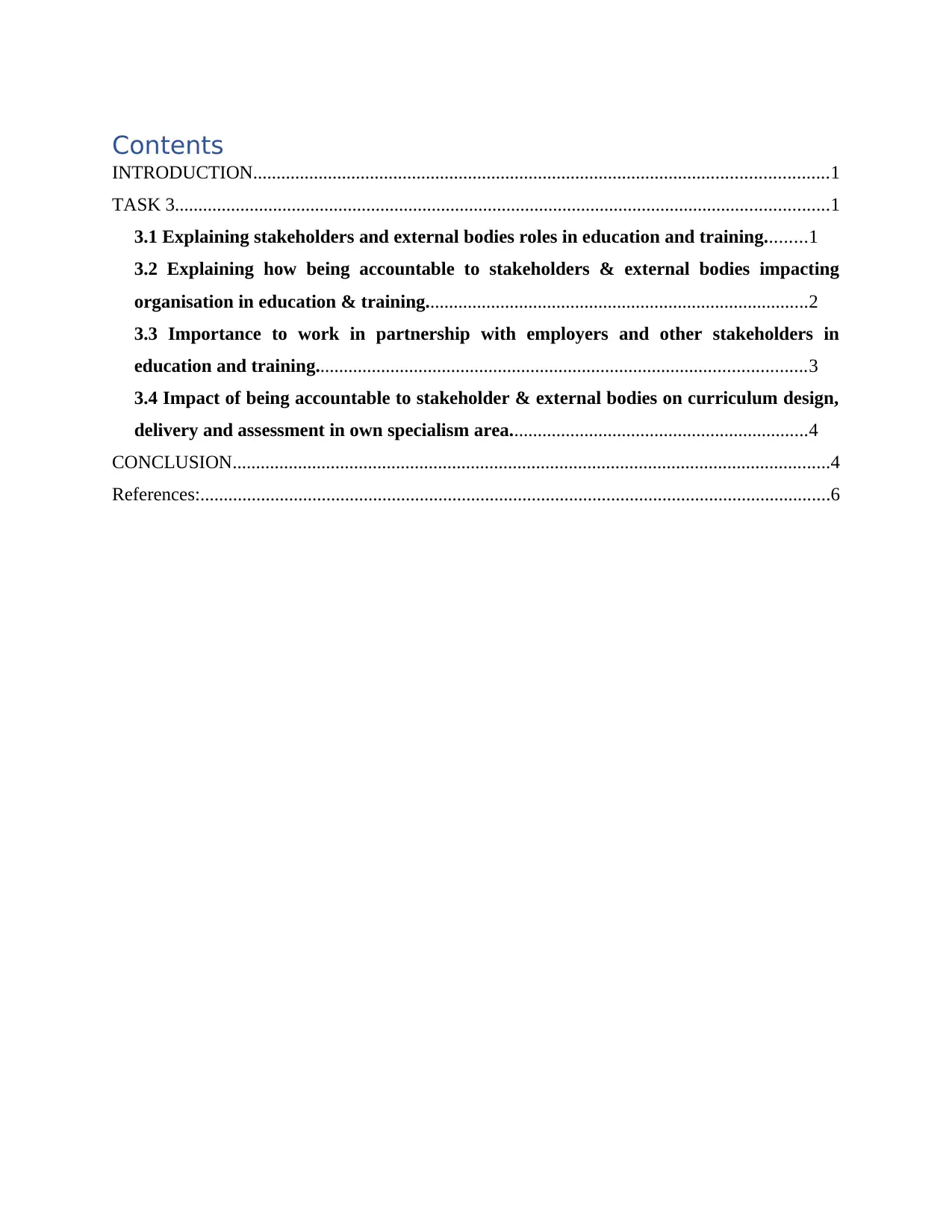
Contents
INTRODUCTION...........................................................................................................................1
TASK 3............................................................................................................................................1
3.1 Explaining stakeholders and external bodies roles in education and training.........1
3.2 Explaining how being accountable to stakeholders & external bodies impacting
organisation in education & training..................................................................................2
3.3 Importance to work in partnership with employers and other stakeholders in
education and training.........................................................................................................3
3.4 Impact of being accountable to stakeholder & external bodies on curriculum design,
delivery and assessment in own specialism area................................................................4
CONCLUSION................................................................................................................................4
References:.......................................................................................................................................6
INTRODUCTION...........................................................................................................................1
TASK 3............................................................................................................................................1
3.1 Explaining stakeholders and external bodies roles in education and training.........1
3.2 Explaining how being accountable to stakeholders & external bodies impacting
organisation in education & training..................................................................................2
3.3 Importance to work in partnership with employers and other stakeholders in
education and training.........................................................................................................3
3.4 Impact of being accountable to stakeholder & external bodies on curriculum design,
delivery and assessment in own specialism area................................................................4
CONCLUSION................................................................................................................................4
References:.......................................................................................................................................6
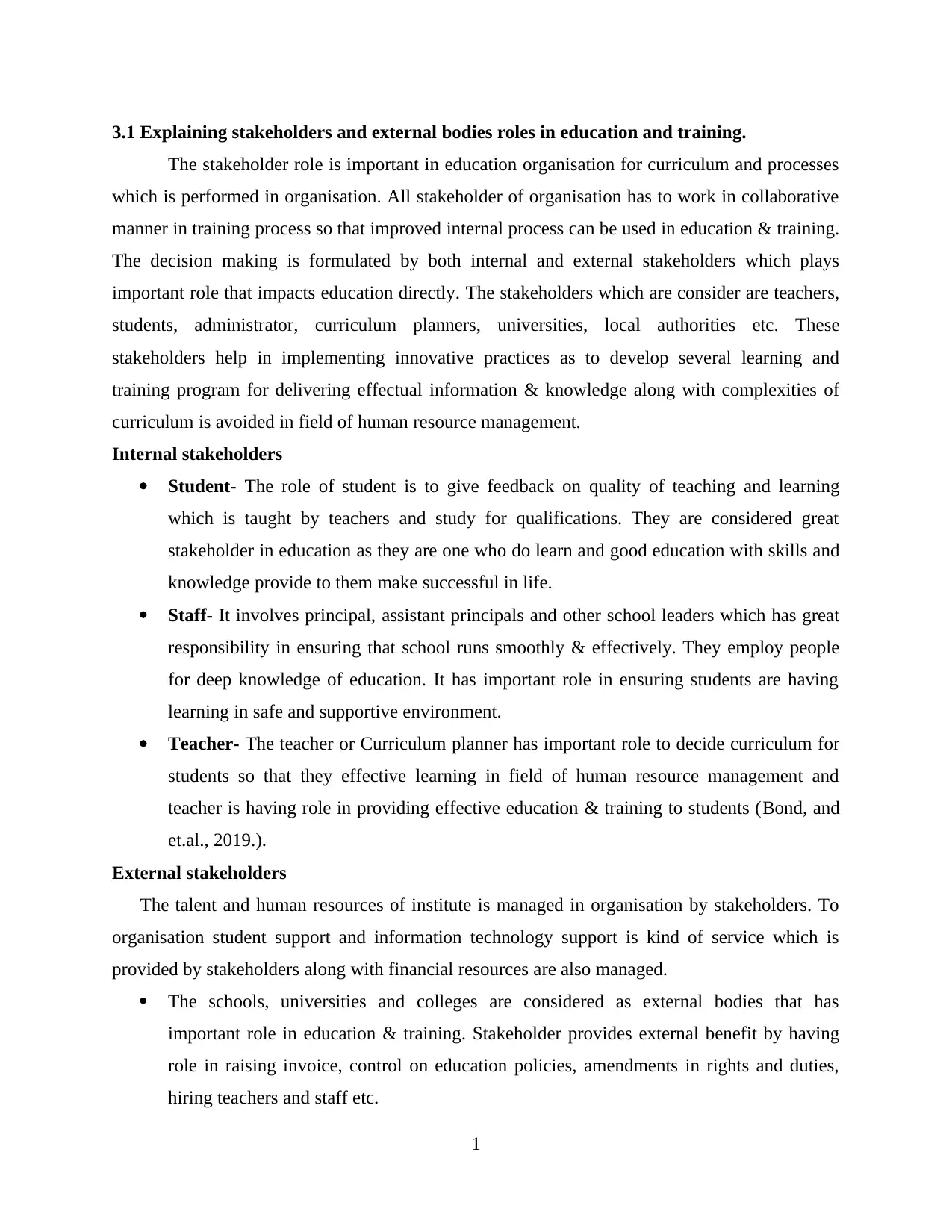
3.1 Explaining stakeholders and external bodies roles in education and training.
The stakeholder role is important in education organisation for curriculum and processes
which is performed in organisation. All stakeholder of organisation has to work in collaborative
manner in training process so that improved internal process can be used in education & training.
The decision making is formulated by both internal and external stakeholders which plays
important role that impacts education directly. The stakeholders which are consider are teachers,
students, administrator, curriculum planners, universities, local authorities etc. These
stakeholders help in implementing innovative practices as to develop several learning and
training program for delivering effectual information & knowledge along with complexities of
curriculum is avoided in field of human resource management.
Internal stakeholders
Student- The role of student is to give feedback on quality of teaching and learning
which is taught by teachers and study for qualifications. They are considered great
stakeholder in education as they are one who do learn and good education with skills and
knowledge provide to them make successful in life.
Staff- It involves principal, assistant principals and other school leaders which has great
responsibility in ensuring that school runs smoothly & effectively. They employ people
for deep knowledge of education. It has important role in ensuring students are having
learning in safe and supportive environment.
Teacher- The teacher or Curriculum planner has important role to decide curriculum for
students so that they effective learning in field of human resource management and
teacher is having role in providing effective education & training to students (Bond, and
et.al., 2019.).
External stakeholders
The talent and human resources of institute is managed in organisation by stakeholders. To
organisation student support and information technology support is kind of service which is
provided by stakeholders along with financial resources are also managed.
The schools, universities and colleges are considered as external bodies that has
important role in education & training. Stakeholder provides external benefit by having
role in raising invoice, control on education policies, amendments in rights and duties,
hiring teachers and staff etc.
1
The stakeholder role is important in education organisation for curriculum and processes
which is performed in organisation. All stakeholder of organisation has to work in collaborative
manner in training process so that improved internal process can be used in education & training.
The decision making is formulated by both internal and external stakeholders which plays
important role that impacts education directly. The stakeholders which are consider are teachers,
students, administrator, curriculum planners, universities, local authorities etc. These
stakeholders help in implementing innovative practices as to develop several learning and
training program for delivering effectual information & knowledge along with complexities of
curriculum is avoided in field of human resource management.
Internal stakeholders
Student- The role of student is to give feedback on quality of teaching and learning
which is taught by teachers and study for qualifications. They are considered great
stakeholder in education as they are one who do learn and good education with skills and
knowledge provide to them make successful in life.
Staff- It involves principal, assistant principals and other school leaders which has great
responsibility in ensuring that school runs smoothly & effectively. They employ people
for deep knowledge of education. It has important role in ensuring students are having
learning in safe and supportive environment.
Teacher- The teacher or Curriculum planner has important role to decide curriculum for
students so that they effective learning in field of human resource management and
teacher is having role in providing effective education & training to students (Bond, and
et.al., 2019.).
External stakeholders
The talent and human resources of institute is managed in organisation by stakeholders. To
organisation student support and information technology support is kind of service which is
provided by stakeholders along with financial resources are also managed.
The schools, universities and colleges are considered as external bodies that has
important role in education & training. Stakeholder provides external benefit by having
role in raising invoice, control on education policies, amendments in rights and duties,
hiring teachers and staff etc.
1
⊘ This is a preview!⊘
Do you want full access?
Subscribe today to unlock all pages.

Trusted by 1+ million students worldwide
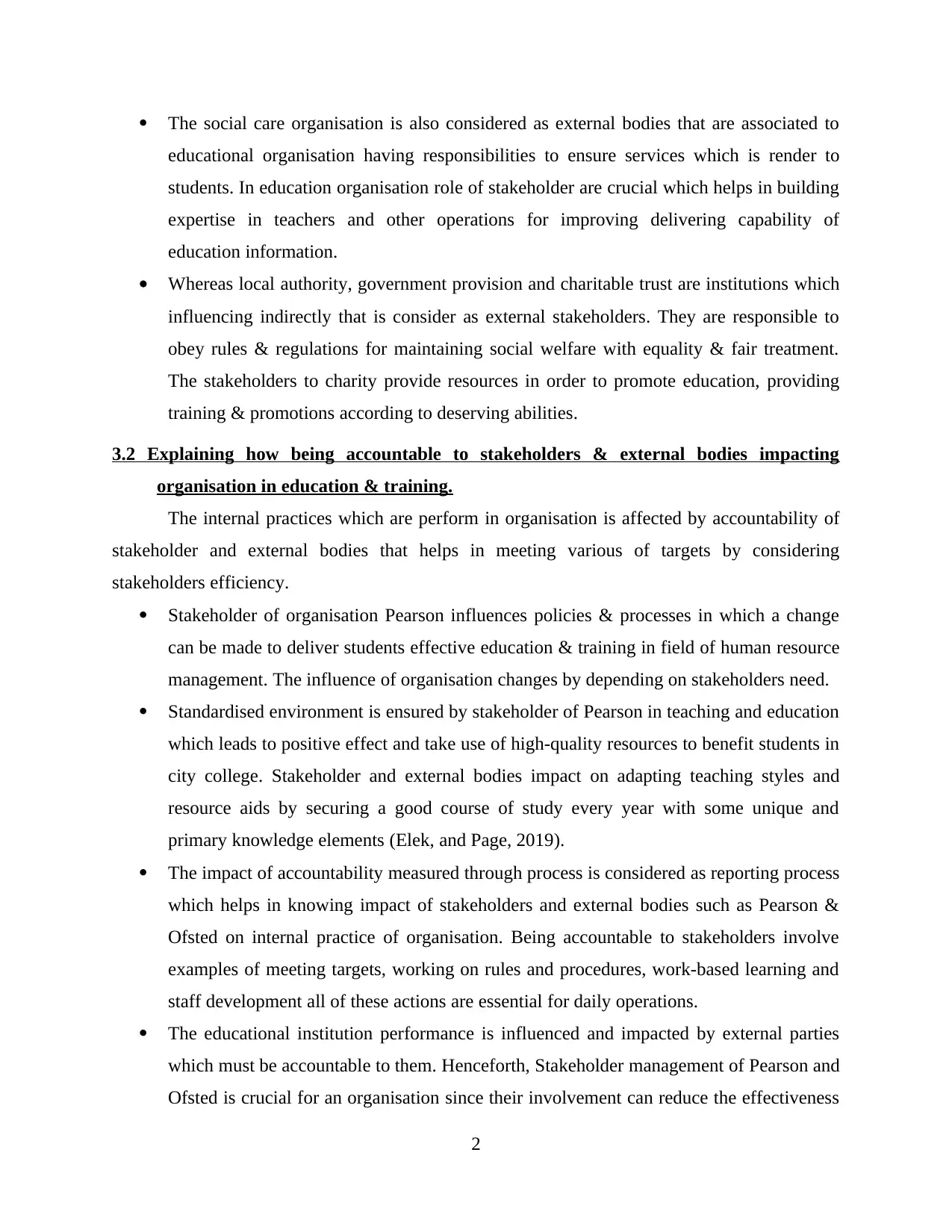
The social care organisation is also considered as external bodies that are associated to
educational organisation having responsibilities to ensure services which is render to
students. In education organisation role of stakeholder are crucial which helps in building
expertise in teachers and other operations for improving delivering capability of
education information.
Whereas local authority, government provision and charitable trust are institutions which
influencing indirectly that is consider as external stakeholders. They are responsible to
obey rules & regulations for maintaining social welfare with equality & fair treatment.
The stakeholders to charity provide resources in order to promote education, providing
training & promotions according to deserving abilities.
3.2 Explaining how being accountable to stakeholders & external bodies impacting
organisation in education & training.
The internal practices which are perform in organisation is affected by accountability of
stakeholder and external bodies that helps in meeting various of targets by considering
stakeholders efficiency.
Stakeholder of organisation Pearson influences policies & processes in which a change
can be made to deliver students effective education & training in field of human resource
management. The influence of organisation changes by depending on stakeholders need.
Standardised environment is ensured by stakeholder of Pearson in teaching and education
which leads to positive effect and take use of high-quality resources to benefit students in
city college. Stakeholder and external bodies impact on adapting teaching styles and
resource aids by securing a good course of study every year with some unique and
primary knowledge elements (Elek, and Page, 2019).
The impact of accountability measured through process is considered as reporting process
which helps in knowing impact of stakeholders and external bodies such as Pearson &
Ofsted on internal practice of organisation. Being accountable to stakeholders involve
examples of meeting targets, working on rules and procedures, work-based learning and
staff development all of these actions are essential for daily operations.
The educational institution performance is influenced and impacted by external parties
which must be accountable to them. Henceforth, Stakeholder management of Pearson and
Ofsted is crucial for an organisation since their involvement can reduce the effectiveness
2
educational organisation having responsibilities to ensure services which is render to
students. In education organisation role of stakeholder are crucial which helps in building
expertise in teachers and other operations for improving delivering capability of
education information.
Whereas local authority, government provision and charitable trust are institutions which
influencing indirectly that is consider as external stakeholders. They are responsible to
obey rules & regulations for maintaining social welfare with equality & fair treatment.
The stakeholders to charity provide resources in order to promote education, providing
training & promotions according to deserving abilities.
3.2 Explaining how being accountable to stakeholders & external bodies impacting
organisation in education & training.
The internal practices which are perform in organisation is affected by accountability of
stakeholder and external bodies that helps in meeting various of targets by considering
stakeholders efficiency.
Stakeholder of organisation Pearson influences policies & processes in which a change
can be made to deliver students effective education & training in field of human resource
management. The influence of organisation changes by depending on stakeholders need.
Standardised environment is ensured by stakeholder of Pearson in teaching and education
which leads to positive effect and take use of high-quality resources to benefit students in
city college. Stakeholder and external bodies impact on adapting teaching styles and
resource aids by securing a good course of study every year with some unique and
primary knowledge elements (Elek, and Page, 2019).
The impact of accountability measured through process is considered as reporting process
which helps in knowing impact of stakeholders and external bodies such as Pearson &
Ofsted on internal practice of organisation. Being accountable to stakeholders involve
examples of meeting targets, working on rules and procedures, work-based learning and
staff development all of these actions are essential for daily operations.
The educational institution performance is influenced and impacted by external parties
which must be accountable to them. Henceforth, Stakeholder management of Pearson and
Ofsted is crucial for an organisation since their involvement can reduce the effectiveness
2
Paraphrase This Document
Need a fresh take? Get an instant paraphrase of this document with our AI Paraphraser
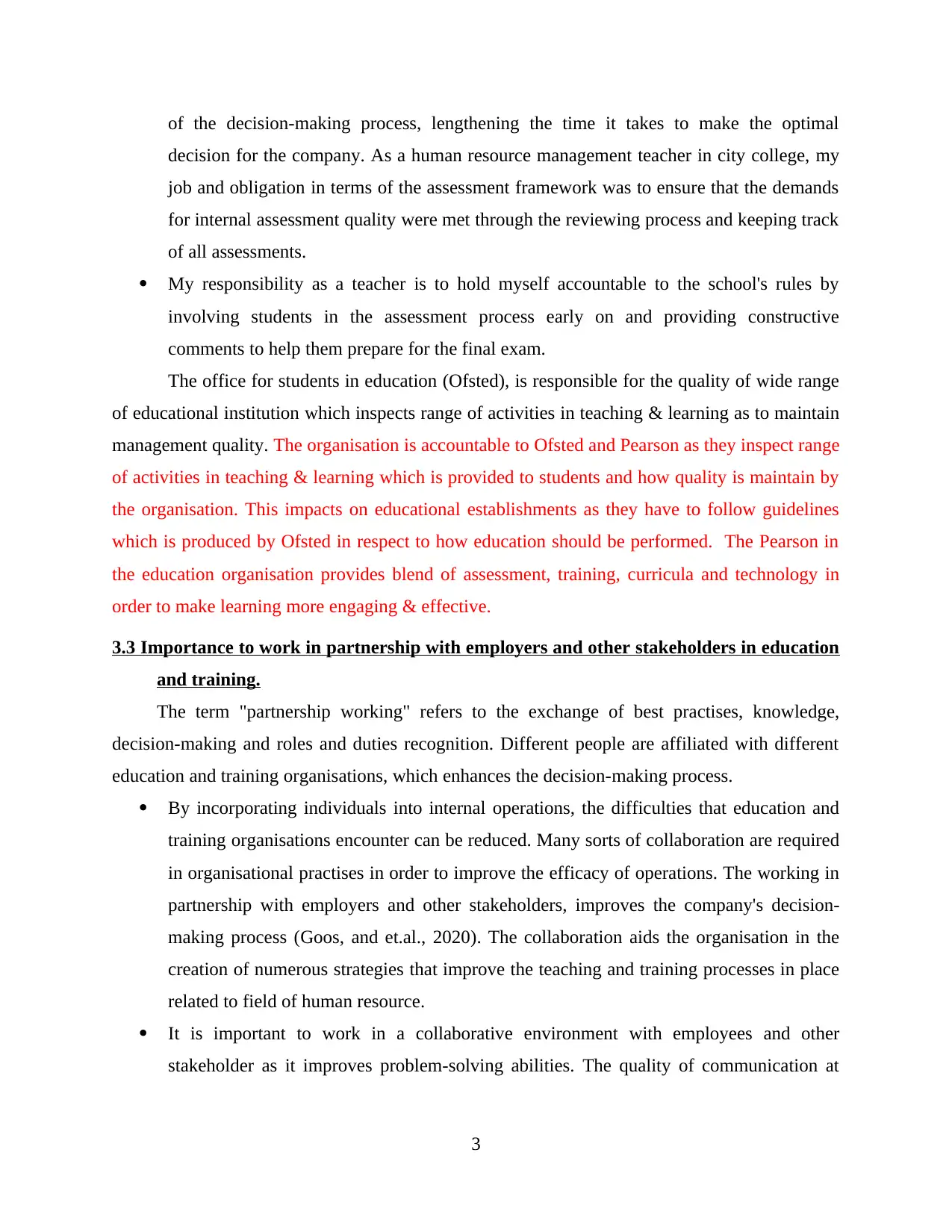
of the decision-making process, lengthening the time it takes to make the optimal
decision for the company. As a human resource management teacher in city college, my
job and obligation in terms of the assessment framework was to ensure that the demands
for internal assessment quality were met through the reviewing process and keeping track
of all assessments.
My responsibility as a teacher is to hold myself accountable to the school's rules by
involving students in the assessment process early on and providing constructive
comments to help them prepare for the final exam.
The office for students in education (Ofsted), is responsible for the quality of wide range
of educational institution which inspects range of activities in teaching & learning as to maintain
management quality. The organisation is accountable to Ofsted and Pearson as they inspect range
of activities in teaching & learning which is provided to students and how quality is maintain by
the organisation. This impacts on educational establishments as they have to follow guidelines
which is produced by Ofsted in respect to how education should be performed. The Pearson in
the education organisation provides blend of assessment, training, curricula and technology in
order to make learning more engaging & effective.
3.3 Importance to work in partnership with employers and other stakeholders in education
and training.
The term "partnership working" refers to the exchange of best practises, knowledge,
decision-making and roles and duties recognition. Different people are affiliated with different
education and training organisations, which enhances the decision-making process.
By incorporating individuals into internal operations, the difficulties that education and
training organisations encounter can be reduced. Many sorts of collaboration are required
in organisational practises in order to improve the efficacy of operations. The working in
partnership with employers and other stakeholders, improves the company's decision-
making process (Goos, and et.al., 2020). The collaboration aids the organisation in the
creation of numerous strategies that improve the teaching and training processes in place
related to field of human resource.
It is important to work in a collaborative environment with employees and other
stakeholder as it improves problem-solving abilities. The quality of communication at
3
decision for the company. As a human resource management teacher in city college, my
job and obligation in terms of the assessment framework was to ensure that the demands
for internal assessment quality were met through the reviewing process and keeping track
of all assessments.
My responsibility as a teacher is to hold myself accountable to the school's rules by
involving students in the assessment process early on and providing constructive
comments to help them prepare for the final exam.
The office for students in education (Ofsted), is responsible for the quality of wide range
of educational institution which inspects range of activities in teaching & learning as to maintain
management quality. The organisation is accountable to Ofsted and Pearson as they inspect range
of activities in teaching & learning which is provided to students and how quality is maintain by
the organisation. This impacts on educational establishments as they have to follow guidelines
which is produced by Ofsted in respect to how education should be performed. The Pearson in
the education organisation provides blend of assessment, training, curricula and technology in
order to make learning more engaging & effective.
3.3 Importance to work in partnership with employers and other stakeholders in education
and training.
The term "partnership working" refers to the exchange of best practises, knowledge,
decision-making and roles and duties recognition. Different people are affiliated with different
education and training organisations, which enhances the decision-making process.
By incorporating individuals into internal operations, the difficulties that education and
training organisations encounter can be reduced. Many sorts of collaboration are required
in organisational practises in order to improve the efficacy of operations. The working in
partnership with employers and other stakeholders, improves the company's decision-
making process (Goos, and et.al., 2020). The collaboration aids the organisation in the
creation of numerous strategies that improve the teaching and training processes in place
related to field of human resource.
It is important to work in a collaborative environment with employees and other
stakeholder as it improves problem-solving abilities. The quality of communication at
3
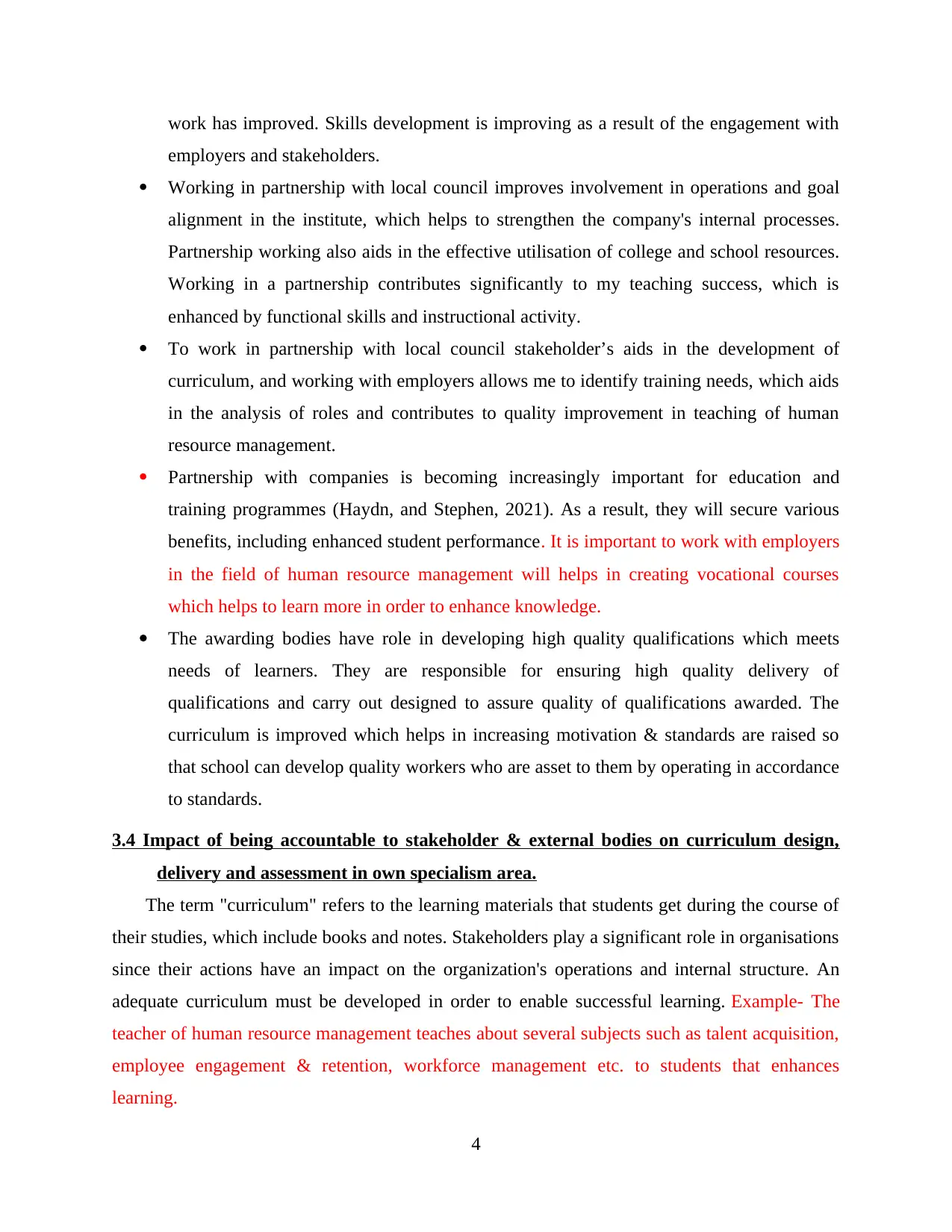
work has improved. Skills development is improving as a result of the engagement with
employers and stakeholders.
Working in partnership with local council improves involvement in operations and goal
alignment in the institute, which helps to strengthen the company's internal processes.
Partnership working also aids in the effective utilisation of college and school resources.
Working in a partnership contributes significantly to my teaching success, which is
enhanced by functional skills and instructional activity.
To work in partnership with local council stakeholder’s aids in the development of
curriculum, and working with employers allows me to identify training needs, which aids
in the analysis of roles and contributes to quality improvement in teaching of human
resource management.
Partnership with companies is becoming increasingly important for education and
training programmes (Haydn, and Stephen, 2021). As a result, they will secure various
benefits, including enhanced student performance. It is important to work with employers
in the field of human resource management will helps in creating vocational courses
which helps to learn more in order to enhance knowledge.
The awarding bodies have role in developing high quality qualifications which meets
needs of learners. They are responsible for ensuring high quality delivery of
qualifications and carry out designed to assure quality of qualifications awarded. The
curriculum is improved which helps in increasing motivation & standards are raised so
that school can develop quality workers who are asset to them by operating in accordance
to standards.
3.4 Impact of being accountable to stakeholder & external bodies on curriculum design,
delivery and assessment in own specialism area.
The term "curriculum" refers to the learning materials that students get during the course of
their studies, which include books and notes. Stakeholders play a significant role in organisations
since their actions have an impact on the organization's operations and internal structure. An
adequate curriculum must be developed in order to enable successful learning. Example- The
teacher of human resource management teaches about several subjects such as talent acquisition,
employee engagement & retention, workforce management etc. to students that enhances
learning.
4
employers and stakeholders.
Working in partnership with local council improves involvement in operations and goal
alignment in the institute, which helps to strengthen the company's internal processes.
Partnership working also aids in the effective utilisation of college and school resources.
Working in a partnership contributes significantly to my teaching success, which is
enhanced by functional skills and instructional activity.
To work in partnership with local council stakeholder’s aids in the development of
curriculum, and working with employers allows me to identify training needs, which aids
in the analysis of roles and contributes to quality improvement in teaching of human
resource management.
Partnership with companies is becoming increasingly important for education and
training programmes (Haydn, and Stephen, 2021). As a result, they will secure various
benefits, including enhanced student performance. It is important to work with employers
in the field of human resource management will helps in creating vocational courses
which helps to learn more in order to enhance knowledge.
The awarding bodies have role in developing high quality qualifications which meets
needs of learners. They are responsible for ensuring high quality delivery of
qualifications and carry out designed to assure quality of qualifications awarded. The
curriculum is improved which helps in increasing motivation & standards are raised so
that school can develop quality workers who are asset to them by operating in accordance
to standards.
3.4 Impact of being accountable to stakeholder & external bodies on curriculum design,
delivery and assessment in own specialism area.
The term "curriculum" refers to the learning materials that students get during the course of
their studies, which include books and notes. Stakeholders play a significant role in organisations
since their actions have an impact on the organization's operations and internal structure. An
adequate curriculum must be developed in order to enable successful learning. Example- The
teacher of human resource management teaches about several subjects such as talent acquisition,
employee engagement & retention, workforce management etc. to students that enhances
learning.
4
⊘ This is a preview!⊘
Do you want full access?
Subscribe today to unlock all pages.

Trusted by 1+ million students worldwide
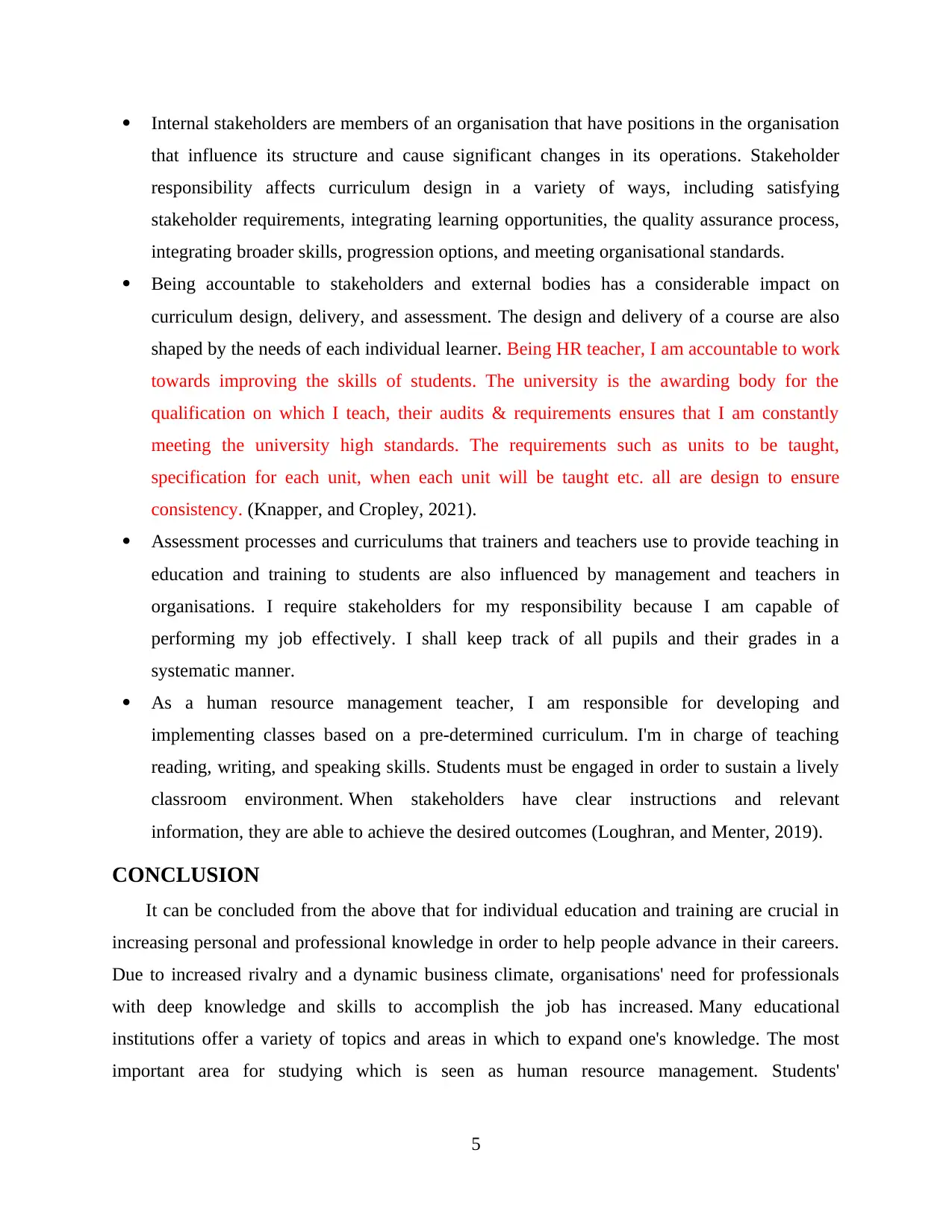
Internal stakeholders are members of an organisation that have positions in the organisation
that influence its structure and cause significant changes in its operations. Stakeholder
responsibility affects curriculum design in a variety of ways, including satisfying
stakeholder requirements, integrating learning opportunities, the quality assurance process,
integrating broader skills, progression options, and meeting organisational standards.
Being accountable to stakeholders and external bodies has a considerable impact on
curriculum design, delivery, and assessment. The design and delivery of a course are also
shaped by the needs of each individual learner. Being HR teacher, I am accountable to work
towards improving the skills of students. The university is the awarding body for the
qualification on which I teach, their audits & requirements ensures that I am constantly
meeting the university high standards. The requirements such as units to be taught,
specification for each unit, when each unit will be taught etc. all are design to ensure
consistency. (Knapper, and Cropley, 2021).
Assessment processes and curriculums that trainers and teachers use to provide teaching in
education and training to students are also influenced by management and teachers in
organisations. I require stakeholders for my responsibility because I am capable of
performing my job effectively. I shall keep track of all pupils and their grades in a
systematic manner.
As a human resource management teacher, I am responsible for developing and
implementing classes based on a pre-determined curriculum. I'm in charge of teaching
reading, writing, and speaking skills. Students must be engaged in order to sustain a lively
classroom environment. When stakeholders have clear instructions and relevant
information, they are able to achieve the desired outcomes (Loughran, and Menter, 2019).
CONCLUSION
It can be concluded from the above that for individual education and training are crucial in
increasing personal and professional knowledge in order to help people advance in their careers.
Due to increased rivalry and a dynamic business climate, organisations' need for professionals
with deep knowledge and skills to accomplish the job has increased. Many educational
institutions offer a variety of topics and areas in which to expand one's knowledge. The most
important area for studying which is seen as human resource management. Students'
5
that influence its structure and cause significant changes in its operations. Stakeholder
responsibility affects curriculum design in a variety of ways, including satisfying
stakeholder requirements, integrating learning opportunities, the quality assurance process,
integrating broader skills, progression options, and meeting organisational standards.
Being accountable to stakeholders and external bodies has a considerable impact on
curriculum design, delivery, and assessment. The design and delivery of a course are also
shaped by the needs of each individual learner. Being HR teacher, I am accountable to work
towards improving the skills of students. The university is the awarding body for the
qualification on which I teach, their audits & requirements ensures that I am constantly
meeting the university high standards. The requirements such as units to be taught,
specification for each unit, when each unit will be taught etc. all are design to ensure
consistency. (Knapper, and Cropley, 2021).
Assessment processes and curriculums that trainers and teachers use to provide teaching in
education and training to students are also influenced by management and teachers in
organisations. I require stakeholders for my responsibility because I am capable of
performing my job effectively. I shall keep track of all pupils and their grades in a
systematic manner.
As a human resource management teacher, I am responsible for developing and
implementing classes based on a pre-determined curriculum. I'm in charge of teaching
reading, writing, and speaking skills. Students must be engaged in order to sustain a lively
classroom environment. When stakeholders have clear instructions and relevant
information, they are able to achieve the desired outcomes (Loughran, and Menter, 2019).
CONCLUSION
It can be concluded from the above that for individual education and training are crucial in
increasing personal and professional knowledge in order to help people advance in their careers.
Due to increased rivalry and a dynamic business climate, organisations' need for professionals
with deep knowledge and skills to accomplish the job has increased. Many educational
institutions offer a variety of topics and areas in which to expand one's knowledge. The most
important area for studying which is seen as human resource management. Students'
5
Paraphrase This Document
Need a fresh take? Get an instant paraphrase of this document with our AI Paraphraser
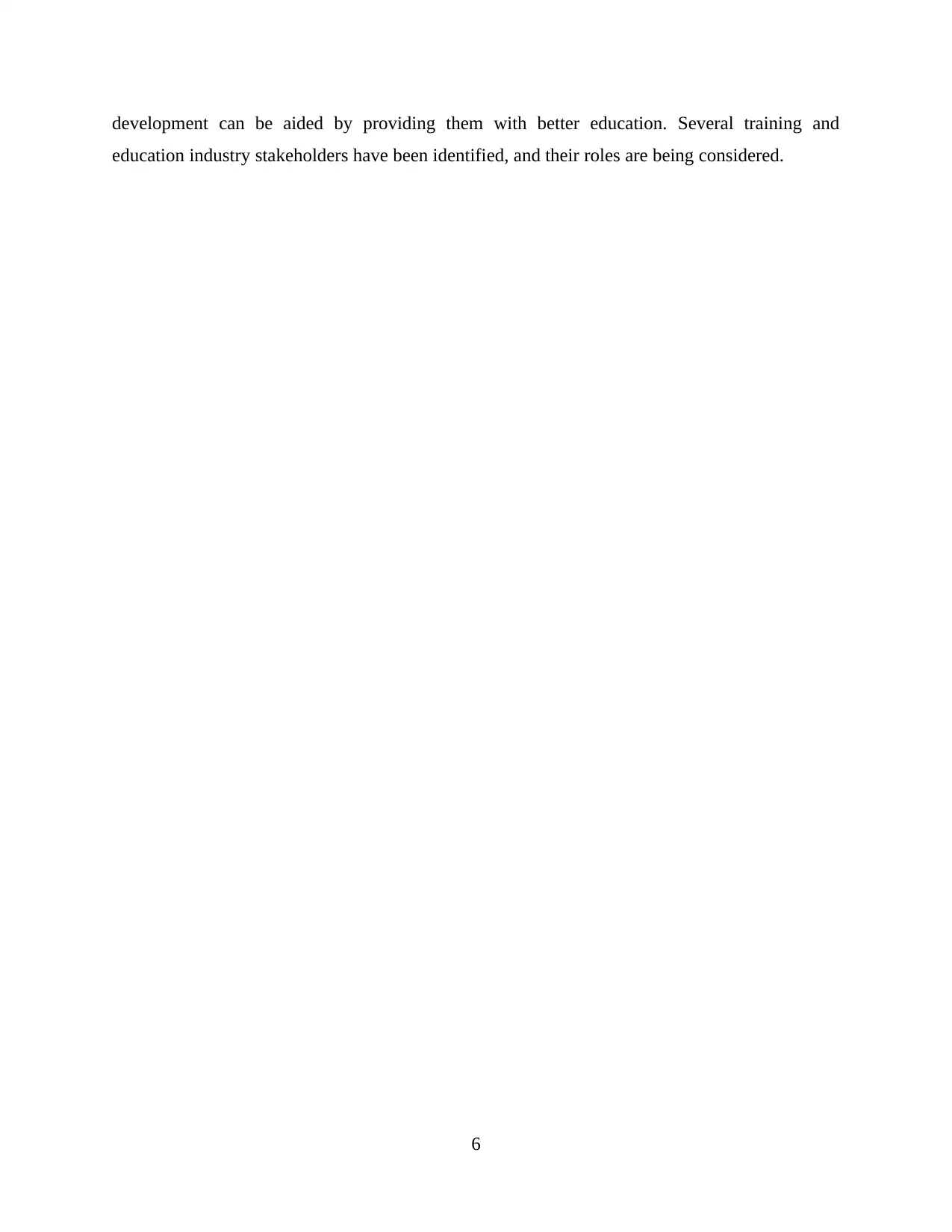
development can be aided by providing them with better education. Several training and
education industry stakeholders have been identified, and their roles are being considered.
6
education industry stakeholders have been identified, and their roles are being considered.
6
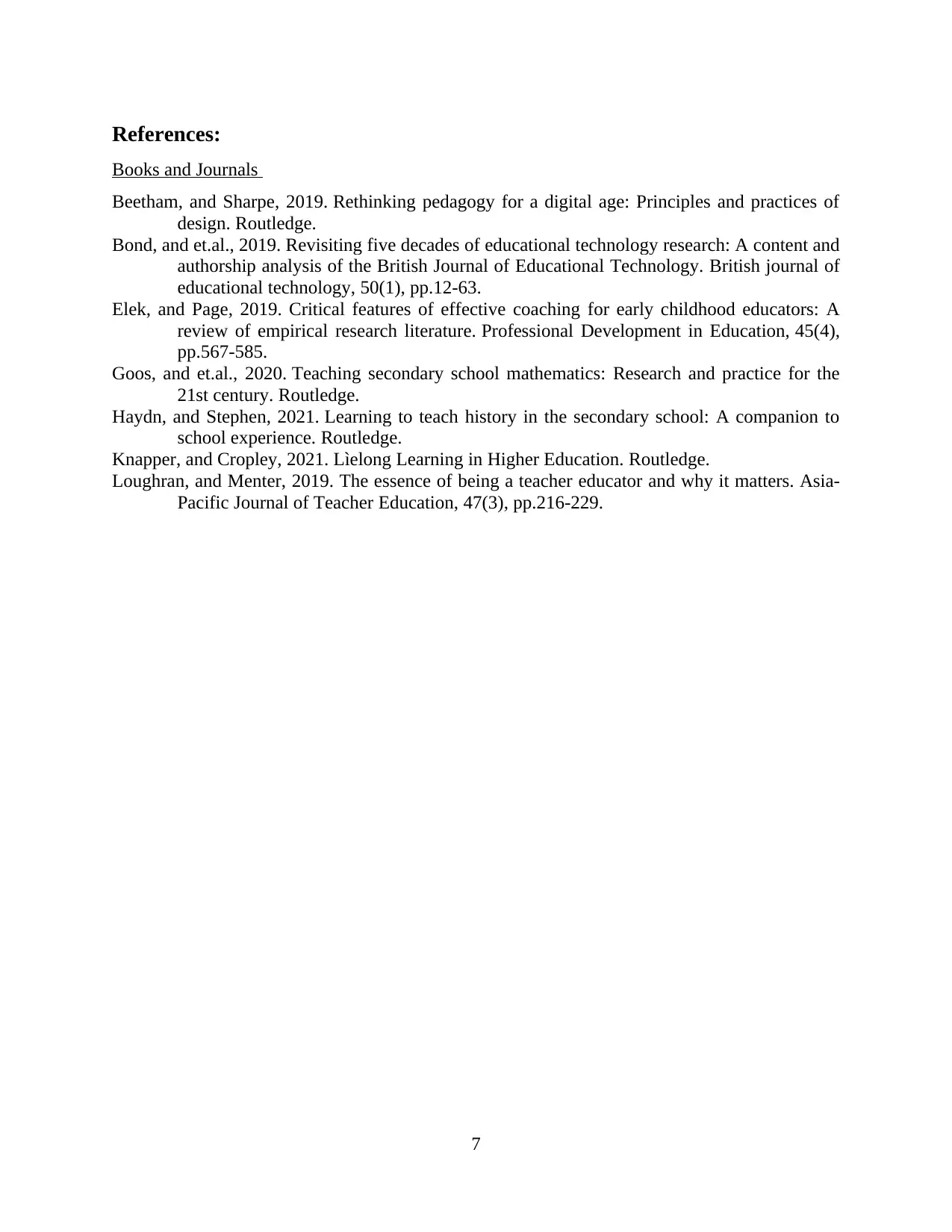
References:
Books and Journals
Beetham, and Sharpe, 2019. Rethinking pedagogy for a digital age: Principles and practices of
design. Routledge.
Bond, and et.al., 2019. Revisiting five decades of educational technology research: A content and
authorship analysis of the British Journal of Educational Technology. British journal of
educational technology, 50(1), pp.12-63.
Elek, and Page, 2019. Critical features of effective coaching for early childhood educators: A
review of empirical research literature. Professional Development in Education, 45(4),
pp.567-585.
Goos, and et.al., 2020. Teaching secondary school mathematics: Research and practice for the
21st century. Routledge.
Haydn, and Stephen, 2021. Learning to teach history in the secondary school: A companion to
school experience. Routledge.
Knapper, and Cropley, 2021. Lìelong Learning in Higher Education. Routledge.
Loughran, and Menter, 2019. The essence of being a teacher educator and why it matters. Asia-
Pacific Journal of Teacher Education, 47(3), pp.216-229.
7
Books and Journals
Beetham, and Sharpe, 2019. Rethinking pedagogy for a digital age: Principles and practices of
design. Routledge.
Bond, and et.al., 2019. Revisiting five decades of educational technology research: A content and
authorship analysis of the British Journal of Educational Technology. British journal of
educational technology, 50(1), pp.12-63.
Elek, and Page, 2019. Critical features of effective coaching for early childhood educators: A
review of empirical research literature. Professional Development in Education, 45(4),
pp.567-585.
Goos, and et.al., 2020. Teaching secondary school mathematics: Research and practice for the
21st century. Routledge.
Haydn, and Stephen, 2021. Learning to teach history in the secondary school: A companion to
school experience. Routledge.
Knapper, and Cropley, 2021. Lìelong Learning in Higher Education. Routledge.
Loughran, and Menter, 2019. The essence of being a teacher educator and why it matters. Asia-
Pacific Journal of Teacher Education, 47(3), pp.216-229.
7
⊘ This is a preview!⊘
Do you want full access?
Subscribe today to unlock all pages.

Trusted by 1+ million students worldwide
1 out of 9
Related Documents
Your All-in-One AI-Powered Toolkit for Academic Success.
+13062052269
info@desklib.com
Available 24*7 on WhatsApp / Email
![[object Object]](/_next/static/media/star-bottom.7253800d.svg)
Unlock your academic potential
Copyright © 2020–2026 A2Z Services. All Rights Reserved. Developed and managed by ZUCOL.



